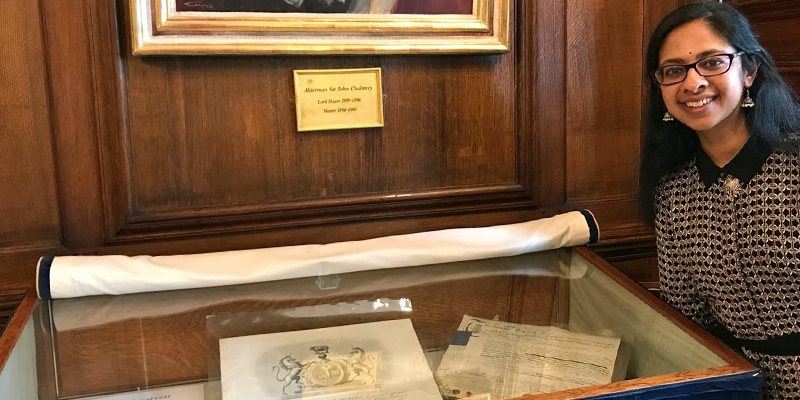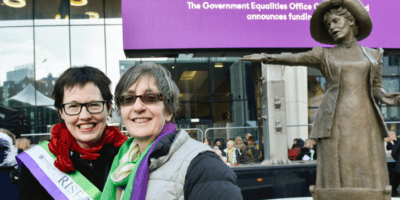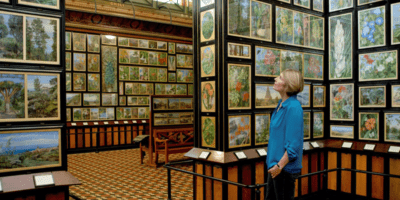Dr Nuthana Bhayankaram is a paediatric registrar and vice president of the Medical Women’s Federation. Nuthana is an academic paediatric trainee with a particular interest in endocrinology, having studied medicine at the University of Birmingham. She is also passionate about diversity and inclusion.
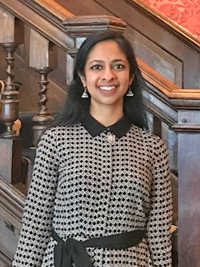
“Whenever I am met with a difficult task, I think ‘If Elizabeth Garrett Anderson became the first woman to get her licensing exam in the UK, I can do this’ and it gives me inspiration and courage.”
Career to date
I studied medicine at the University of Birmingham, graduating in 2015. I have since been doing clinical and academic training and am currently part way through my training to become a paediatric consultant. (You can read more about my career to date in my first Womanthology article from October last year.)
Recognition for my predecessors who paved the way for me and my colleagues
I think it’s lovely we have Women’s History Month as so many of the contributions of women have been unrecognised or forgotten. For me, the topic of the history of women in medicine is so important because it shows me how much my predecessors have paved the way for me and my colleagues today, and this, in turn, inspires me to do my bit to help future medical women.
The Medical Women’s Federation was founded in 1917 and women 105 years ago were not able to vote and were expected to stop working when they got married or became pregnant so we can only imagine the difficulties they had in trying to get equality with their male medic colleagues. It’s thanks to all of their campaigning that we do have a more equal society today, although we do still have a lot of challenges to tackle.
Launching a podcast to support and empower
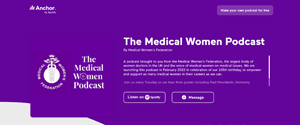
I also looked through our archives at the Wellcome Trust Library and included some stories of the founding members of the MWF. From the interviews and my search through the archives, I have taken some quotes which we have been posting out on social media every day from the 9th of March as a celebration of medical women for women’s history month.
Celebrating the life and work of Elizabeth Garrett Anderson
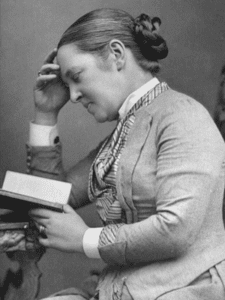
Elizabeth Garrett Anderson was the first woman doctor to gain her licence to practice in the UK. The first woman doctor in the UK was Elizabeth Blackwell, but she studied medicine in the US and then moved back to the UK to practice medicine. Elizabeth Garrett Anderson met Elizabeth Blackwell and was inspired to follow in her footsteps.
Born in 1836, she was one of 12 children of a businessman who became wealthy and seems to have been a feminist as he wanted his daughters to have just as good an education as his sons. Elizabeth was expected to finish school and then marry and live as a lady. However, meeting suffragettes and Elizabeth Blackwell inspired Elizabeth Garrett Anderson to become a doctor.
In the MWF archives I found an article written about her in Medical Woman magazine which said that “upon her declaring to her mother her wish to study medicine, Mrs Garrett was shocked and shut her herself in her room weeping for two days”. Her mother perhaps knew that her daughter would have to work really hard or was perhaps worried about how she would be viewed in society at the time.
Women were not allowed into medical school at the time, but the Society of Apothecaries did not specifically exclude women from taking exams (they assumed no women would apply so they did not specify it as an exclusion criteria) so she used that loophole to get her licence to practice on the 28th of September 1865. However, she was determined to gain a medical degree and successfully taught herself French and gained her degree from the University of Paris. However, the Medical Register in the UK did not accept her qualification; I wonder if they would have done the same to a man?
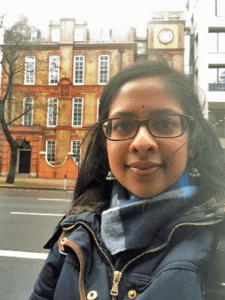
In 1872, she founded The New Hospital for Women in London, which later became the Elizabeth Garrett Anderson Hospital. You can still see the building today on Euston Road. Professor Wendy Savage, Past President of the Medical Women’s Federation (1992-1993), played a big part in ensuring that the hospital building was not knocked down during her time as President.
Elizabeth Garrett Anderson became the first woman mayor in England in 1908. She died in December 1917, a few months after the Medical Women’s Federation was founded. Although she was not a member, her history makes her a pioneering medical woman and she has been commemorated several times by the MWF, including a dinner celebrating the centenary of her qualification in 1965.
From a personal point of view, I am the first doctor in my family and was interested to learn that she got her licence to practice on the 28th of September 1865 – exactly 144 years later, I had my first day at medical school!
Joint event with the Worshipful Society of Apothecaries for International Women’s Day
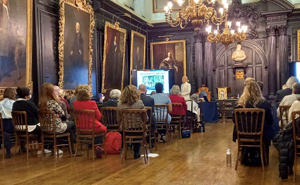
We recently held a joint event with the Worshipful Society of Apothecaries and the Medical Women’s Federation for International Women’s Day, with fantastic talks on aspects of women’s safety in cities. It was my first trip to the Apothecaries – it is a beautiful building with lots of history.
Since 1815, The Society of Apothecaries has been licensing doctors to practice Medicine.
Women were not allowed into medical school at the time, but the Society of Apothecaries did not specifically exclude women from taking exams (they assumed no women would apply so they did not specify it as an exclusion criteria) so she used that loophole to get her license to practice on the 28th of September 1865.
I really enjoyed seeing Elizabeth’s portrait and her examination certificate on display.
Learning from Elizabeth and her life
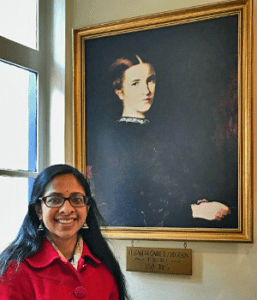
I suppose Elizabeth is an important figure for me because she is the first woman to have gained her medical qualification in the UK; I can only imagine how tough that must have been and all the prejudice and bias she faced from her peers and teachers. Yet she didn’t give up and she persevered. Whenever I am met with a difficult task, I think ‘If Elizabeth Garrett Anderson became the first woman to get her licensing exam in the UK, I can do this’, and it gives me inspiration and courage.
To me, her story shows her tenacity and determination. If your mother and all of society think you are mad to be pursuing something, it takes a great deal of courage and determination to go for it and keep going despite ongoing challenges. She saw that there was a need for women doctors and nothing else could put her off.
She also exemplifies someone who lifted as she climbed; other women were not able to gain their licensing exam from the Society of Apothecaries but she helped them to find other ways around the system. Sometimes we get told ‘no’ and we give up; Elizabeth shows us that if you are determined enough, you can always find a way.
I find her incredibly inspiring and I am grateful to be following in her footsteps as a medical woman. I hope that I can follow in her example of lifting as I climb and helping to improve things for future medical women.
How Womanthology can readers support the Medical Women’s Federation
As I mentioned, we have a new podcast, The Medical Women Podcast, which you are very welcome to listen to! Women in different sectors are facing the same challenges and it would be great to cross-collaborate and work together to #BreakTheBias. Do get in touch if you would like to cross collaborate with us. It’s always really helpful to get our message out to more people so do follow us on social media and help us in continuing to campaign for gender equity in medicine and society.
Springing into action
In April we have our Spring Conference, which is our first in-person conference since the pandemic began; hoorah! The topic is Disruptors in Medicine and we have a wonderful lineup of inspiring speakers. I am really looking forward to networking with everyone and seeing familiar faces and welcoming newcomers too.
I also have lots of exciting podcast interviews coming up, so I am really looking forward to those too!
Elizabeth Garrett Anderson photo image credit: By Walery – http://www.notablebiographies.com/A-An/Anderson-Elizabeth-Garrett.html, Public Domain, https://commons.wikimedia.org/w/index.php?curid=3733286

